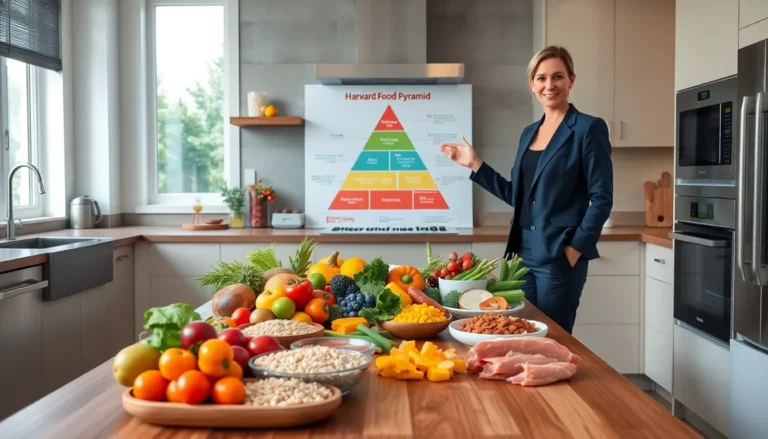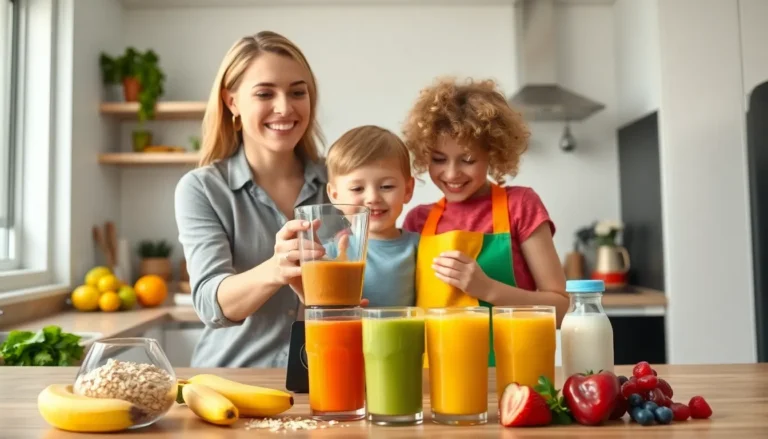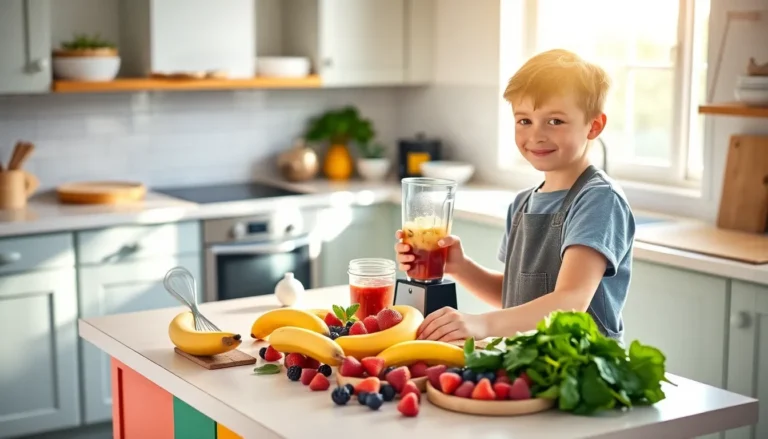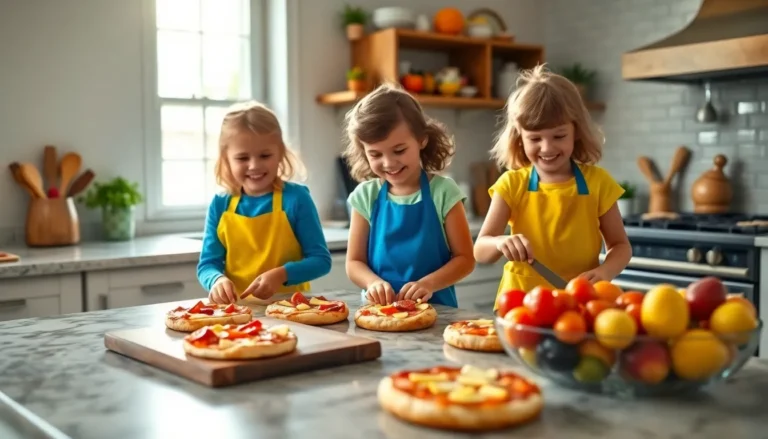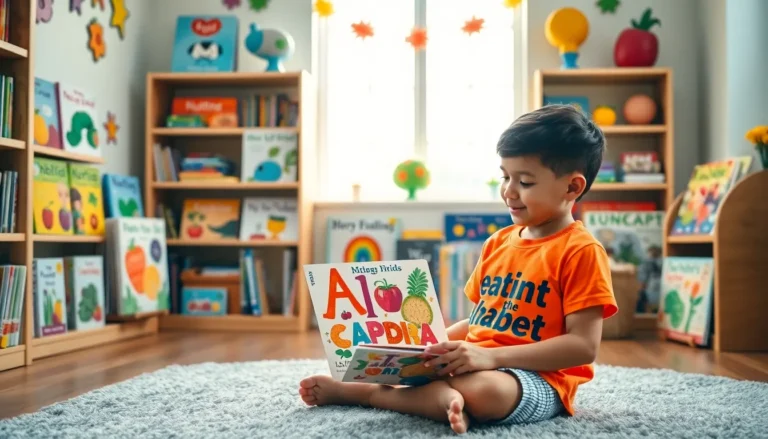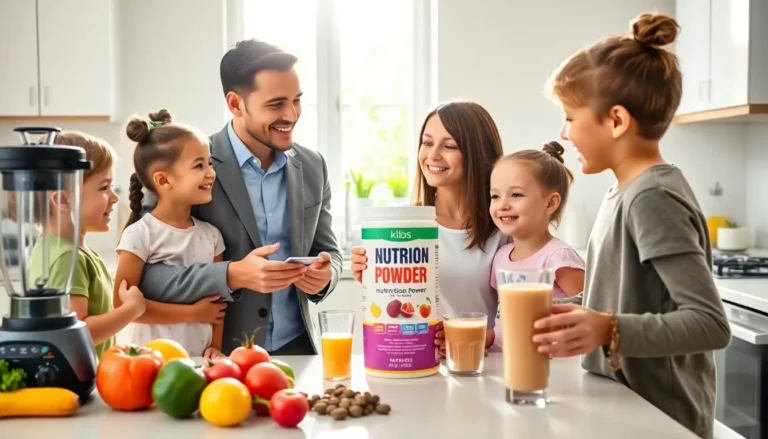Table of Contents
ToggleCooking with preschoolers is more than just a fun activity; it’s a valuable opportunity for learning and bonding. Engaging young children in the kitchen helps develop essential skills like counting, measuring, and following directions while sparking their creativity. Plus, it’s a great way to introduce healthy eating habits early on.
As they mix, stir, and taste, preschoolers gain confidence and a sense of accomplishment. These hands-on experiences create lasting memories and lay the foundation for a lifelong love of cooking. Whether it’s baking cookies or preparing simple meals, the kitchen becomes a place of exploration and discovery. With the right approach, cooking can transform mealtime into an exciting adventure for both kids and parents.
Benefits of Cooking With Preschoolers
Cooking with preschoolers offers significant benefits, promoting essential skills and fostering healthy habits while creating enjoyable experiences.
Developing Motor Skills
Cooking helps preschoolers develop fine and gross motor skills. Cutting vegetables improves hand-eye coordination. Stirring and mixing ingredients enhances wrist strength. Pouring liquids builds control and precision. These activities contribute to overall physical development.
Encouraging Healthy Eating Habits
Involving preschoolers in cooking encourages healthier food choices. Children exposed to different ingredients often show increased interest in fruits and vegetables. By participating in meal preparation, they learn about nutrition and the importance of balanced diets. This hands-on experience can lead to lifelong healthy eating habits.
Fun and Safe Cooking Activities
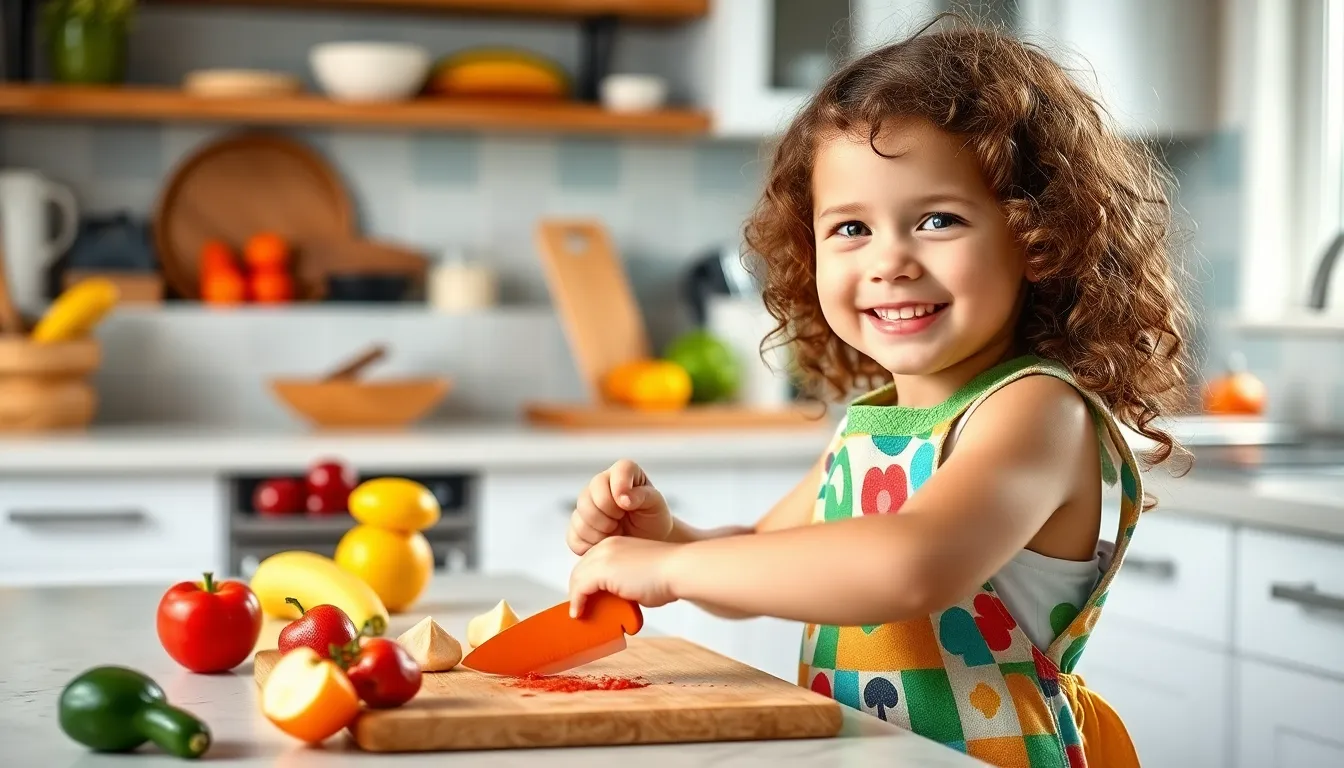
Cooking with preschoolers can be an exciting and rewarding experience. Engaging them with fun activities not only makes cooking enjoyable but also ensures their safety in the kitchen.
Simple Recipes to Try
- Fruit Salad: Chop various fruits, such as apples, bananas, and berries. Let preschoolers practice using plastic knives for cutting soft fruits.
- Mini Pizzas: Use English muffins or pita bread as bases. Spread tomato sauce, sprinkle cheese, and add precut vegetables like bell peppers and olives.
- Pancakes: Mix pancake batter using a measuring cup for flour and a whisk. Let preschoolers pour the batter onto the griddle with supervision.
- Trail Mix: Combine nuts, seeds, dried fruit, and whole-grain cereals. Preschoolers can scoop ingredients into a bowl using measuring cups.
- Vegetable Sticks and Dip: Cut vegetables like carrots and cucumbers into sticks. Serve with hummus or yogurt dip for a healthy snack.
Kitchen Safety Tips for Young Chefs
- Supervision: Always supervise preschoolers during cooking activities, especially near hot surfaces or sharp objects.
- Child-Safe Tools: Provide age-appropriate utensils, such as plastic knives and measuring cups, to prevent injuries.
- Clean Hands: Teach preschoolers the importance of washing hands thoroughly before and after cooking to ensure hygiene.
- Fire Safety: Explain kitchen hazards, like stoves and ovens, making sure preschoolers understand they should never touch hot surfaces without permission.
- Keep a Safe Distance: Designate a safe cooking area where preschoolers can work without getting too close to hot appliances or sharp items.
Engaging Preschoolers in the Kitchen
Engaging preschoolers in the kitchen creates fun opportunities for learning and bonding. Age-appropriate tasks and making cooking a learning experience enhances their involvement.
Age-Appropriate Tasks
Assigning age-appropriate tasks encourages preschoolers to participate meaningfully. Consider these simple tasks for young chefs:
- Washing fruits and vegetables: Preschoolers can rinse produce under cold running water.
- Mixing ingredients: Kids can use safe, child-friendly utensils to stir batter or combine salad ingredients.
- Measuring: Preschoolers can practice measuring with cups and spoons, learning about quantities.
- Tearing herbs or greens: Young ones can easily tear basil or spinach leaves for salads or garnishes.
- Plating food: Allow them to arrange food items on plates, fostering creativity and presentation skills.
These tasks promote skill development while maintaining safety and engagement.
Making Cooking a Learning Experience
Cooking provides ample learning opportunities. Incorporate educational elements into the process:
- Counting: Count ingredients together, such as how many tomatoes to chop or pieces of cheese to use.
- Colors and shapes: Describe the colors and shapes of different ingredients, enhancing vocabulary and observational skills.
- Nutrition: Discuss the benefits of various foods, such as why vegetables are important for health.
- Cultural learning: Explore recipes from different cultures, introducing children to diverse cuisines and customs.
- Problem-solving: Involve preschoolers in decision-making, such as substituting missing ingredients or adjusting recipes.
Transforming cooking into a learning experience cultivates curiosity and expands knowledge while creating enjoyable moments in the kitchen.
Overcoming Challenges in Cooking Together
Cooking with preschoolers presents unique challenges. Mess and distraction are common, but they can be managed effectively.
Dealing with Mess and Distraction
Mess is inevitable when cooking with young children. Choose to use a workspace that’s easy to clean. Cover surfaces with a wipeable tablecloth or use baking sheets to catch spills. Encourage children to participate in cleaning up, turning it into an engaging activity rather than a chore. Utilize child-size aprons to mitigate the effects of spills on clothes. Keep distractions low by limiting background noise. Engaging preschoolers with simple tasks, like mixing or pouring, keeps their focus while enhancing their culinary experience.
Building Patience and Teamwork
Building patience and teamwork can transform cooking into a collaborative experience. Assign roles based on children’s abilities. He can stir while she measures, helping them learn to respect each other’s contributions. Give positive reinforcement to encourage persistence through challenges, such as waiting for their turn. Use timers to manage task completion, making waiting fun rather than frustrating. Explain that cooking is a process that requires time, promoting a sense of accomplishment as they finish each step together. This collaborative approach deepens bonds and fosters a spirit of cooperation in the kitchen.
Cooking with preschoolers transforms mealtime into an enjoyable adventure. It’s a wonderful way to build essential skills while creating lasting memories. The kitchen becomes a space for exploration where children can learn about nutrition and healthy eating habits.
Through hands-on activities, they develop confidence and motor skills. The collaborative nature of cooking fosters teamwork and patience, making it a valuable bonding experience. By embracing the mess and distractions, parents can guide their little ones in a safe and supportive environment.
Ultimately, involving preschoolers in cooking not only enhances their culinary skills but also nurtures a lifelong love for food and creativity. This journey in the kitchen is sure to spark curiosity and joy for both kids and parents alike.

